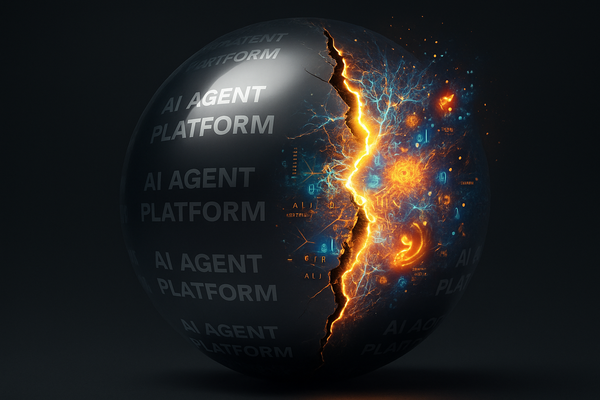From Manual to Magical: The 'Then and Now' of Automation

The year is 2019. A customer service representative juggles multiple calls while manually inputting data into a CRM system. Down the hall, marketing teams brainstorm content ideas on whiteboards, and sales representatives cold-call from printed lists. Fast forward to 2024, and the landscape has transformed dramatically. Welcome to the age of AI-driven business automation, where efficiency isn't just a goal—it's a reality.
The Great Shift: From Manual to Magical
"AI is no longer a fancy addition to business operations—it's becoming the backbone of how successful companies function," - Pranav Gupta, senior data scientist at Lowe's
This transformation isn't just about replacing old systems; it's about reimagining how businesses operate from the ground up.
Consider the evolution of customer service. Remember those infuriating "your call is important to us" messages played on endless loops? Today, Cisco's Webex AI Agent is revolutionizing customer interactions, with projected satisfaction improvements of 39%. These AI systems don't just answer questions; they understand context, emotion, and intent, providing solutions that feel remarkably human.
The Sales Revolution: From Cold Calls to Warm Leads
Perhaps nowhere is the transformation more evident than in sales and lead generation. Gone are the days when sales representatives would spend hours cold-calling from generic contact lists. Today's AI-powered systems analyze vast amounts of data to identify high-potential leads and predict buying patterns with unprecedented accuracy.
"AI acts as a sophisticated personal assistant. It's not just about finding leads; it's about understanding them." - Bob Seaton, CTO advisor at BUILT
This shift has transformed the sales process from a numbers game to a precision operation, with AI handling everything from initial prospect identification to personalized outreach strategies.
Marketing's Metamorphosis: From Gut Feelings to Data-Driven Decisions
The marketing landscape has undergone an equally dramatic transformation. According to Forrester's 2025 predictions, nearly two-thirds of global B2B marketing leaders are increasing their investment in conversation automation solutions. This isn't just about automating email campaigns; it's about creating highly personalized, data-driven marketing strategies that resonate with individual customers.
Microsoft's recent launch of 10 autonomous AI agents for enterprise use exemplifies this evolution. These tools don't just automate tasks; they learn, adapt, and improve over time, creating a dynamic marketing ecosystem that continuously optimizes for better results.
The Customer Journey: From Paperwork to Digital Excellence
"The future of customer interaction is conversational, personalized, and immediate," - Brian Donahue, Vice President of Product at Intercom
Remember the days of filling out endless forms during customer onboarding? That's becoming as outdated as fax machines. Modern AI-powered onboarding systems create smooth, personalized experiences that can reduce onboarding time from days to minutes.
The Human Element: Enhanced, Not Replaced
Despite fears of AI replacing human workers, the reality is more nuanced. AI handles routine tasks, freeing humans to focus on what they do best: building relationships, solving complex problems, and providing emotional intelligence that machines can't replicate.
"Think of AI as a universal accelerator. It's not about replacement; it's about enhancement." - Bob Seaton
Looking Ahead: The Future is Already Here
As we look toward 2025 and beyond, the pace of AI-driven transformation shows no signs of slowing. Companies that embrace this change are seeing remarkable results: faster response times, higher customer satisfaction, and improved operational efficiency.
The message is clear: The future of business automation isn't coming—it's here. Those who adapt will thrive, while those who resist may find themselves as outdated as the manual systems they cling to.
For businesses still on the fence about AI adoption, the question isn't whether to embrace AI, but how quickly they can implement it. As Ben Angel, a prominent AI strategist, warns in his recent book, "The Wolf is at The Door," the cost of waiting could be catastrophic in an increasingly AI-driven marketplace.
The transformation from traditional to AI-powered operations represents more than just technological advancement—it's a fundamental shift in how we approach business efficiency. The gap between the 'then' and 'now' of business operations continues to widen, creating unprecedented opportunities for those ready to embrace the future.




